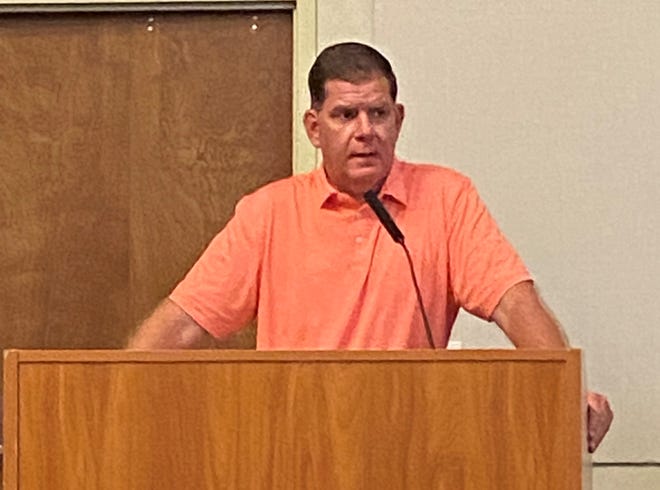
U.S. Labor Secretary Marty Walsh made his third stop in two days in the South on Thursday when he headlined a roundtable discussion on workers’ rights at Jackson State University.
After stops in Little Rock, Arkansas, and Greenville, Walsh, the former mayor of Boston, spoke to a room of nearly 100 people on the struggles many in the Mid-South and across the nation are facing regarding workplace rights, compensation and conditions.
He made note of the H-2A Visa Program, which is meant to help employers find workers where there aren’t enough workers. Instead, in the Mississippi Delta, Walsh said farmers are using the program to bring in foreign workers at a lower wage to replace Black farm workers who have been in place for many years.
READ MORE: Mississippi’s largest ever tax cut takes effect July 1. What does it mean for you?
“It’s a good program,” Walsh said. “Except in the Delta region, that program is being used to take jobs away from Black American workers.”
“This is 2022 and the days of segregation are over; the days of racism need to be in the rear view mirror; the days of workers’ rights needs to be here,” he said. “My job is not to make myself feel good or look good or not raise the minimum wage to keep prices down for employers. My job as a state representative and then as a mayor was to actually go out and pass laws and do things on behalf of working people. I take that same drive and purpose with the job I have now.”
Six workers’ rights organizers were on hand Thursday. They shared stories of what the workplace in Mississippi is like and pushed for more unions to help protect workers’ ability to protect their jobs and wages.
Morris Mock, a career Nissan factory worker organizer, spoke of atmosphere he said does not produce complete disclosure of what would be best for the employee, only what is best for the company.
Christina Jimenez, a local organizer for Workers of America, said one of the main problems with companies in Mississippi is that communication between workers and organizers is heavily monitored and that workers are routinely shown anti-union videos.
“They say unions are evil,” Jimenez said. “They don’t give specifics. They just say (unions) are evil. You are led to believe you are stuck and can’t do anything about the working conditions you are in.”
Jiminez said that when companies like Nissan and Toyota come to Mississippi and offer wages of $15 an hour, poor people in the state are conditioned to think those are good wages because it is better than the minimum wage.
Mock said incentives the State of Mississippi gives big companies to build here are ways to keep employees down and that most people don’t understand that they could be making much more money working the same job in another state.
Rose Turner, the vice president of the UFCW Local 1529, said Mississippi workers need to be more educated about their position in the workplace.
“Unions are only as strong as the people,” Turner said. “Right to work and at-will employment; most folks don’t understand it. You got a right to go to work, and they got a right to fire you at any time for any reason. You need a contract as an insurance policy. If you aren’t educated about your rights, you are behind. We have contracts for our house. We have contracts for our cars and our insurance. We need contracts for our jobs.”
Cassandra Welchin, the executive director for the Mississippi Black Women’s Roundtable, took issue with the Equal Pay legislation that went into law Friday.
“We needed a good equal pay bill, not just any old equal pay bill,” Welchin said. “It codifies into law that a woman can be paid less based on her salary history. It’s even more impactful for black women and brown women. So, if you weren’t making much money to begin with, then you won’t get more money based on this bill. It will also discriminate against women based on employment gaps.”
Pam Johnson with the Mississippi Association of Educators acknowledged the teacher pay raise given by the legislature this year. Still, she said teachers should have been a part of the process. She explained the Mississippi teacher strike of 1985 and how legislators made it illegal for teachers to strike the following year.
“Technically, I am breaking the law if I suggest a teacher strike,” Johnson said. “We are supposed to be grateful instead of negotiating our own worth.”
Walsh said that in his role as Labor Secretary, he wants to help make life better for people and hopes honest dialogue will help educate people in the South and the rest of the country.
“I am taking much of this back with me to Washington, D.C., and see how we can make a difference,” Walsh said.

